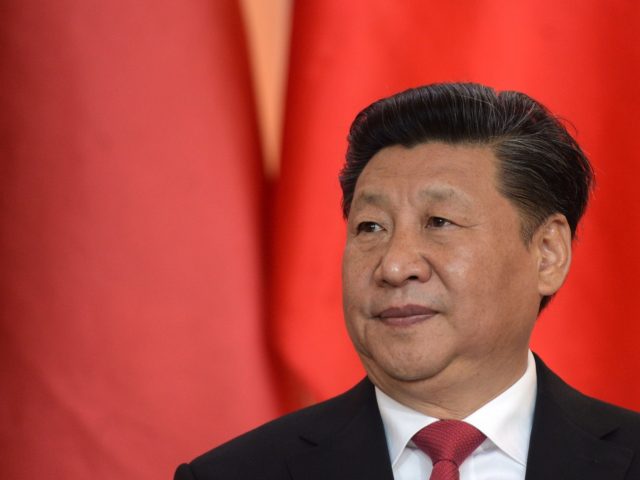Chinese dictator Xi Jinping addressed strengthening border security in Tibet – where most of China’s border with India is located – for the first time since a bloody encounter between the two nations’ militaries resulted in dozens of deaths in June, the state-run People’s Daily reported on Monday.
Xi reportedly spoke at the Communist Party’s highest-level event to discuss the occupation of Tibet, the two-day “Central Symposium on Tibet Work,” on Saturday. The event was the seventh of its kind ever held and the first since 2015; the Communist Party organized the first in 1980.
According to the People’s Daily, the official newspaper of the Communist Party of China, Xi dedicated most of the remarks to the repression of the native Tibetan people. Tibetans are ethnically, linguistically, and religiously distinct from the Han majority that governs the Party and Tibetans have for decades objected to the Party’s takeover of Tibetan Buddhism, limits on teaching children Tibetan language and culture in schools, and its campaign to smear and capture the Dalai Lama.
“Efforts must be made to build a new and modern socialist Tibet that is united, prosperous, culturally advanced, harmonious and beautiful,” the People’s Daily quoted Xi as saying, “Tibetan Buddhism should be guided in adapting to the socialist society and should be developed in the Chinese context.”
“He underlined the importance of strengthening patriotic education in all schools, and required continuous efforts to enhance awareness of the motherland, the Chinese nation, Chinese culture, the CPC and socialism with Chinese characteristics among people of all ethnic groups,” the propaganda newspaper added.
The People’s Daily noted that Xi also remarked on the situation on the Tibetan border, which spans the Himalayas and primarily faces India.
C-SPAN“In his speech at the symposium, Xi called for efforts to ensure national security and long-lasting peace and stability, steadily improve people’s livelihoods, strengthen border defense and ensure frontier security,” the People’s Daily reported, without elaborating.
Reports on Xi’s speech at the symposium in other Chinese state media outlets did not mention that Xi addressed border security other than an early article by the news agency Xinhua, according to the South China Morning Post, but not subsequent coverage. Those remarks also focused on subduing Tibetan Buddhism under the Communist Party and, in Xinhua’s words, “forging an ironclad shield to safeguard stability.” Xinhua added to the People’s Daily reporting that Xi promised the construction of several “major infrastructure projects” in the area.
The Global Times, another state propaganda newspaper, did not note that Xi discussed border security but cited its usual Party-approved “experts” concerned about the issue. One of those commentators, a professor identified as “Wu Xi,” told the newspaper that part of the reason for holding the Tibet symposia is “to get a clear understanding of the threat of outside anti-China forces and overseas separatists.”
Xi’s speech is the most the Chinese public has heard from its head of state about security on the border with India since the June clash with that country, the deadliest in 45 years. The incident occurred in the Galwan Valley, part of the Indian region of Ladakh that borders Aksai Chin, a disputed territory between Tibet and Xinjiang, the westernmost province of China. According to the Indian military and Indian media reports, a melee broke out between Chinese and Indian troops when an Indian officer approached tents erected by the People’s Liberation Army (PLA) on the Indian side of the border. PLA troops responded to being questioned by attacking Indian soldiers with rudimentary weapons including rocks, sticks, and clubs wrapped in barbed wire. The Indian government confirmed 20 deaths in the incident and claimed that the Chinese lost twice that number; China has refused to disclose its casualty count.
After growing reports of outraged Chinese citizens demanding the state reveal the deceased and honor the fallen soldiers, Global Times editor-in-chief Hu Xijin published an editorial urging understanding for the secrecy, claiming it was necessary to avoid “irritating public opinion.”
Chinese Foreign Minister Wang Yi visited Tibet in August but did not specifically address the deadly brawl.
On the other side of the border, Indians responded to the aggression by burning effigies of Xi Jinping – and, on one unfortunate occasion, North Korean dictator Kim Jong-un, who had no known role in the incident – and demanding a full boycott of business with China.
Unlike Xi, who has yet to publically address the Galwan Valley incident, Indian Prime Minister Narendra Modi visited the Galwan Valley, met with injured soldiers recovering from the attack, and delivered a speech at the Chinese border.
“The era of expansionism has come to an end,” Modi declared in his remarks, which occurred in early July. “This is the era of development … History has proved that expansionist forces have either lost or were forced to turn back.”
Modi told India’s soldiers directly, “You have proven time and again that the Indian armed force is mightier and better than everyone else in the world. What you have done here, the message you have sent, is a message that has reached the world. It has been a bold statement.”
As Xi has done with the Galwan Valley, he has remained largely silent or missing from a leadership role on the most important issues facing Chinese citizens today. Xi did not visit Wuhan, the city where the Chinese coronavirus responsible for the ongoing pandemic originated, until March, months after Communist Party-approved doctors had begun claiming that infection rates had dropped there. Xi has only made generalized comments about the historic floods that devastated 27 of the nation’s 31 provinces throughout the past two months, urging local officials to bear the responsibility.
Last year, while millions in Hong Kong protested for freedom from communism, Xi did not lead on the peaceful protest movement defying him on the international stage.

COMMENTS
Please let us know if you're having issues with commenting.